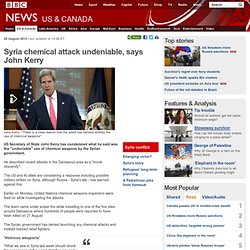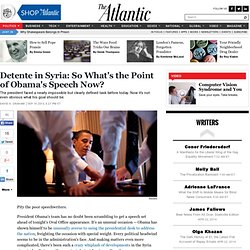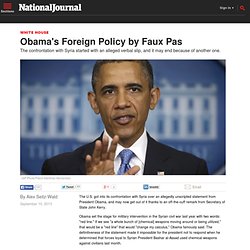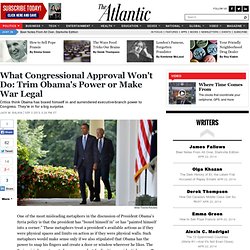

William Polk on Syria: What Now? - James Fallows. Two weeks ago today, just after President Obama made his surprising and very welcome decision to seek Congressional approval before launching strikes on Syria, I posted a very long analysis by William R.

Polk of the stakes, opportunities, risks, and alternatives in dealing with Syria. Despite its length it was for many days our most frequently read item about the choices the Congress, the president, and the public faced. Polk, who first wrote about Iraq for the Atlantic in the later 1950s, and who served on the State Department's Policy Planning staff during the Kennedy administration in the early 1960s, has just written another long analysis of the choices and contradictions ahead. Like the previous one, it is organized as a set of questions and answers. Also like the earlier installment, it is worth reading when you have time to go through it all. By William R. Reflections on the Syrian Chemical Weapons Issue and Beyond. Syria's 99 Percent: The Problem With Focusing on Chemical Weapons - Dominic Tierney. If Assad agrees to forsake sarin, how can we intervene if he continues to slaughter civilians while technically playing by our rules?

A civilian runs with his belongings as he attempts to enter Turkey illegally at the Bab Al-Salam border crossing September 9, 2013. Syria conflict: 'Chemical attacks kill hundreds' 21 August 2013Last updated at 18:31 ET The BBC's Frank Gardner says the footage shows people gasping for breath and convulsing Chemical weapons attacks have killed hundreds on the outskirts of Damascus, Syrian opposition activists say.

Syria chemical attack undeniable, says John Kerry. 26 August 2013Last updated at 19:49 ET.

Detente in Syria: So What's the Point of Obama's Speech Now? - David A. Graham. The president faced a nearly impossible but clearly defined task before today.

Now it's not even obvious what his goal should be. Pity the poor speechwriters. President Obama's team has no doubt been scrambling to get a speech set ahead of tonight's Oval Office appearance. It's an unusual occasion -- Obama has shown himself to be unusually averse to using the presidential desk to address the nation, freighting the occasion with special weight. Every political headwind seems to be in the administration's face.
To recap events briefly: On Monday, John Kerry made a was-it-a-gaffe-or-was-it-genius remark, suggesting the U.S. would call off an attack if Syria agreed to hand over all its chemical weapons. All of this may or may not be good news. Either way, it makes Obama's task tonight much harder. Coming into this week, it was clear what the speech needed to accomplish, even as it seemed nearly impossible to accomplish it all. A Faux-Pas Foreign Policy - Alex Seitz-Wald. The U.S. got into its confrontation with Syria over an allegedly unscripted statement from President Obama, and may now get out of it thanks to an off-the-cuff remark from Secretary of State John Kerry.

Obama set the stage for military intervention in the Syrian civil war last year with two words: "red line. " CNN: 5 takeaways from CNN's Syria poll. Why We're Still Not Intervening in Syria - Michael Hirsh. Bashar al-Assad is, finally, having a very good week.

The latest allegations of chemical-weapons use against the Syrian dictator don't matter nearly as much as other dramatic developments—in particular, the United States' willingness to stand aside while Assad's autocratic brethren in the Egyptian junta cold-bloodedly killed some one thousand protesters, supported by the Saudis and Gulf states. And this week, the chairman of the Joint Chiefs of Staff, Gen. Martin Dempsey, finally said plainly what Obama administration officials have been thinking privately since June, the last time Washington said its "red line" had been crossed and pledged military aid to the Syrian rebels—then did nothing.
In a letter to Rep. Eliot Engel, D-N.Y., Dempsey said flatly that U.S. aid to the rebels know would just end up arming radical, possibly al-Qaida-linked groups. Shorter Version of Spinney on Syria: Don't Do It - James Fallows. The Wise Men of Iraq Give Us Counsel About Syria - James Fallows. Karl Rove, Bill Kristol, Paul Bremer, Elliott Abrams, and other experts speak.

The Syrian question is hard in every way -- morally, strategically, practically. Any choice is bad. If the United States doesn't get involved, it countenances horrors. What Congressional Approval Won't Do: Trim Obama's Power or Make War Legal - Jack M. Balkin. Critics think Obama has boxed himself in and surrendered executive-branch power to Congress.

They’re in for a big surprise. One of the most misleading metaphors in the discussion of President Obama’s Syria policy is that the president has “boxed himself in” or has “painted himself into a corner.” Mr. Idris Goes to Washington: Syrian Rebel Leader May Testify to Congress - Gayle Tzemach Lemmon. It Isn't the Military's Place to Weigh In on the Syria Debate - James Joyner. Far too many servicemembers have made their opinions public -- a violation of both ethics and the fundamental principle that in the U.S., civilians make policy.

America's generals and admirals, junior officers, and enlisted people overwhelmingly oppose military intervention in Syria. We should not know that. Two weeks ago, Robert Scales, a retired Army two-star and former commandant of the Army War College, took to the op-ed pages of the Washington Post, writing that "after personal exchanges with dozens of active and retired soldiers in recent days," he could confidently assert that " the overwhelming opinion of serving professionals" was vehemently against strikes. Time: The Military Importance of the Element of Surprise in Syria. Attacking Syria: Mission (All but) Impossible - Michael Hirsh.
Chuck Hagel, who's had some experience avoiding dumb wars, was strikingly confident about U.S. military plans against Syrian dictator Bashar al-Assad in an interview Tuesday with the BBC. "We are ready to go, like that," the Defense secretary said. Actually, that's not quite true, and Hagel's tough words fail to convey the vast complexities of a military strike against Syria. Military experts and NATO officials are also warning against facile comparisons to the military intervention in Kosovo in 1999 or to the campaign against Muammar el-Qaddafi's Libya in 2011.
That's in part because of the greater sophistication of the Syrian forces, but it's also because President Obama must achieve the nearly impossible. Obama will have to strike the Syrian regime hard enough to send a clear punitive message, thus avoiding criticism that the attacks were merely cosmetic and politically motivated, but not so hard that he tilts the balance in a civil war that he wants no part of. 'Shut Up, He Explained': More on Syria - James Fallows. "Credibility is a fraud," and other reader views.
For those joining us late: I have run a whole skein of posts expressing my own deep skepticism about US/UK military action as a proper signal, punishment, solution, or response to the Syrian disaster. Then I quoted many readers who had a similar point of view. Then a few hours ago I quoted a group of readers making what they considered strong rebuttal cases in favor of intervention. American 'Boots on the Ground' in Syria? John Kerry's Facepalm Moment - Garance Franke-Ruta. The secretary of state said troops could be deployed to Syria if the situation "imploded" -- then quickly walked the statement back. John Kerry is no longer a member of the U.S. Senate. It's a fact he and some of his former colleagues struggled to recall at moments during a Senate Foreign Relations Committee hearing Tuesday on John McCain bantered like old friends, Kerry stood up for his successor's right to display a nameplate, and Barbara Boxer addressed her former colleague as "John," before quickly correcting herself to "Mr.
Secretary. " Kerry, too, at one point seemed to lose sight of the fact he was there as an administration spokesperson seeking to reassure and convince a skeptical public, as well as his former colleagues, and not to think out loud as the discussant he had been for so many years when he served as chairman of the committee. "Mr. "Mr. Wall Street Journal: How War Powers, Congressional Action Have Intersected Over Time.